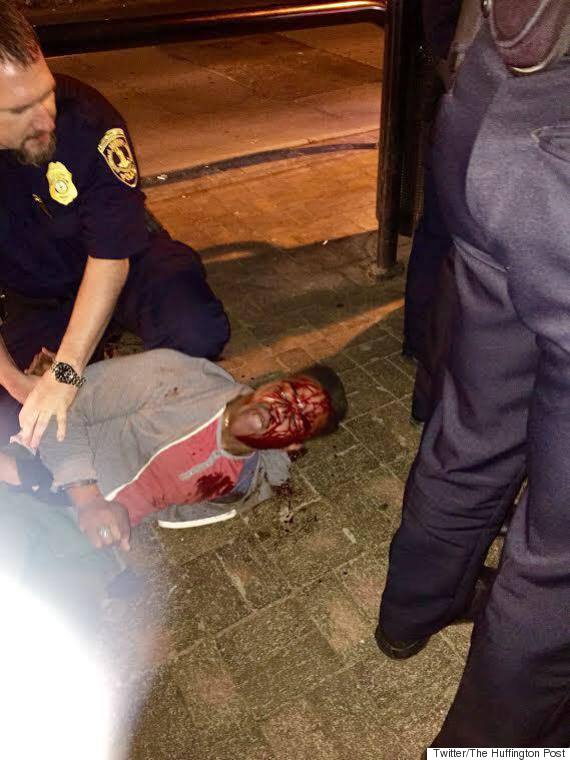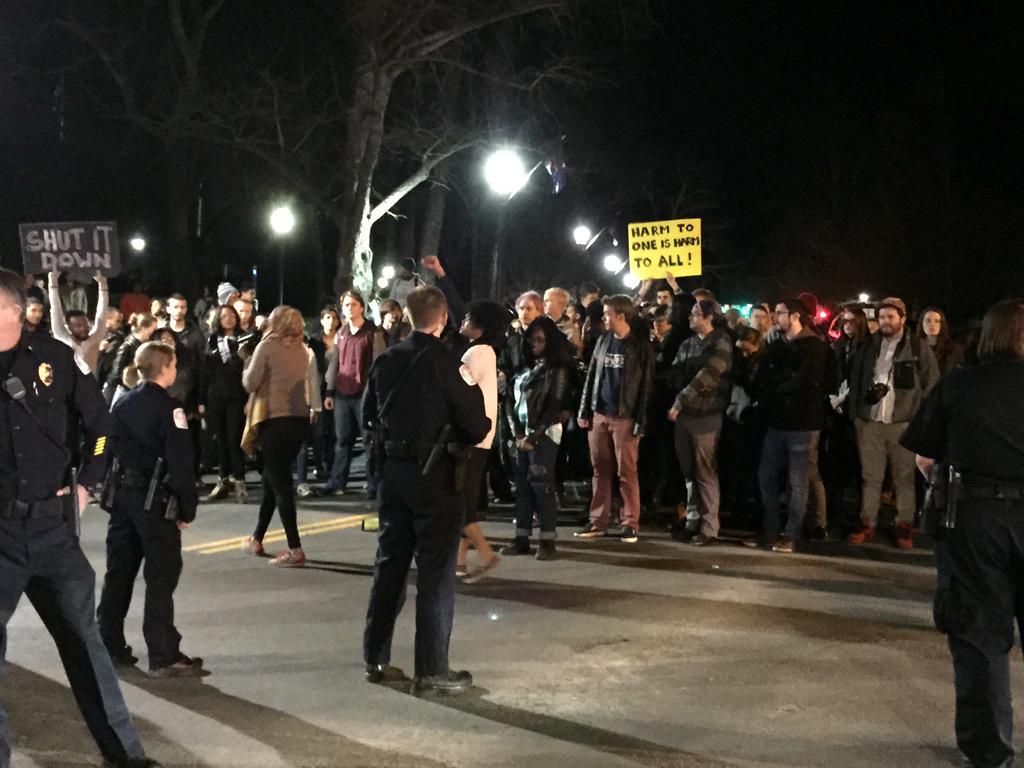
Last night, hundreds of UVA students rallied and marched in protest.

They're just not going to take it any more. This is the kind of thing that gives me hope. I don't believe any of that "millenials are less racist" hype. But there is something more substantial going on. My generation does not remember the civil rights movement. We don't even remember Black Power and the controversies of the 1970s. We honor the achievements of the civil rights generation. They transformed the country for the better. But a critical mass of this generation is done living in their shadow. We're done comparing America to the White supremacist state it was and saying that because it's not that anymore everything is ok. We're ready to compare America to basic standards of justice, decency, and humanity. And when we do that, we find it wanting. We're not going to take it anymore.
It's still a small number of people who feel this way. But (people don't realize this) it was a relatively small number of people who made the civil rights movement happen. Most people did not march. Most people did not protest. We don't need most people. We just need a motivated and mobilized minority to achieve the change we seek.
There was a time not long ago when what happened to Martese Johnson would have gone unnoticed. Not anymore. Many people have woken up, and many people have been radicalized by what they have seen. It matters little that Michael Brown has been a less than perfect exemplar for the movement, any more than the deliberate misrepresentations of Rosa Parks in the 1950s delegitimized the civil rights movement. The movement, and the righteousness of its demands, was bigger than any one individual and story.
Last week, someone shot two police officers in Ferguson. Within four days, officials made an arrest and brought charges (amid allegations that they beat the individual). There are still questions about whether he event meant to shoot at the police. Meanwhile, we have killers on video, whose identities have been known for months, and no arrests have been made.
Tamir Rice's killer has not been arrested or charged.
Jason Harrison's killers have not been arrested or charged, and they are back on duty.
Eric Garner's killers are likewise free.
Antonio Zambrano-Montes' killers are free.
In contrast to the Michael Brown case, these instances are on video. They show inexcusable and reckless violence. We're not going to take it anymore. The police have felt unfairly accused and criticized of late. That's understandable. But it could hardly be otherwise when the state tasks police with the job of enforcing an unjust status quo. From education to housing to employment, the racist structures of our society wrongfully harm millions of people. Sometimes, when police pull the trigger, they are only the final actors in a long process of the state denying the equal humanity of certain classes of its citizens. We had become accustomed to a situation in which the state exercised its monopoly on violence with relative impunity. But we're not going to take it any more. Now we demand accountability. Now we say that manslaughter and murder should be prosecuted regardless of who commits it.
Those who oppose the rule of law for all citizens don't seem to understand this: our view of the police has become more negative not so much because of specific incidents of bad behavior, but because those behaviors have been defended by police officials. In a country of 320 million people, you can find people abusing authority every day. What has been shocking is that police at the highest levels have publicly defended the indefensible all over the country. By doing so in cases like Tamir's and Eric's, they fail in their responsibility to exercise the state's power with restraint and fairness. By defending their own no matter what, they approach the issue with all the moral sophistication of a common street gang. We refuse to accept that this heavily armed group that has been given the power of violence should not be held to a higher standard.
I shouldn't let this go without saying that surely most police officers are good and decent people. But I can't emphasize enough that this misses the point entirely. Most educators are good and decent people. Yet our education system is racially segregated. Most homeowners are good and decent people. Yet our communities are segregated. Most Christians are good and decent people. Yet our churches are racially segregated. We are not attacking individual police officers. We are attacking a system of racism.
Here's another thing, the biggest thing, that gives me hope. Even though the majority of the White evangelical church still slumbers in its sin, a minority has woken up. Christians all over the country are quietly living and working in the neighborhoods that most Americans shun. People of color are taking leadership roles. And a growing number of evangelicals are discovering that passionate concern for things like Black Lives Matter is not less than orthodoxy; it is orthodoxy. A growing number are rejecting the syncretisms of our age: the materialist, feel-good faith, the nationalist faith, and most of all, the attempted union between Whiteness and Christianity. Growing numbers recognize that while the Gospel is more than the Old Testament prophetic tradition, it is certainly not less than that. Growing numbers are willing to reclaim biblical language of shalom, peace, and mishpat, justice, and insist on their relevance today.
I mentioned to an elder from whom I am receiving spiritual instruction that I did not even recognize the Old Testament prophetic tradition of God's care for the weak and wrath toward oppressors until I was an adult. He, an utterly orthodox, conservative, elderly White man, simply said, "Well that's because oppression is our pet sin. Oppressors don't talk about oppression. And White folks have done a lot of evil things in this country." There was no trace of guilt or angst in his response, just simple Christian honesty and humility. A growing number of evangelicals are embracing this honesty.
At my alma mater, Moody Bible Institute, a bastion of historic fundamentalism, the president has unequivocally spoken about the unjust advantages White people have in the United States. For those who know a little of the history of Moody and of White fundamentalism more broadly, this is an astonishing change. The Gospel Coalition, an influential network of evangelical leaders, hosts honest discussion of racism on its website and is holding a big conference on the subject later this year.
It's too early to say that any of this is yet mainstream in White evangelicalism. But the ground is shifting beneath our feet. As a historian, I admit that I am not at all sure the Black Lives Matter Movement will amount to much. As a Christian, however, I have great hope. We need to pray more fervently, act more diligently, and call the church to rise up. What group or organization is better positioned to act locally in thousands of communities across the country? What group is better positioned to know its community's needs and the reforms that are needed? What group is better able to encourage spiritual depth and responsibility, and bring good news to the poor that is more than the empty, soulless materialism of the American Dream?
In the last movement, the White evangelical church reluctantly accepted the changes that had taken place. It followed. Now it is time to lead.
